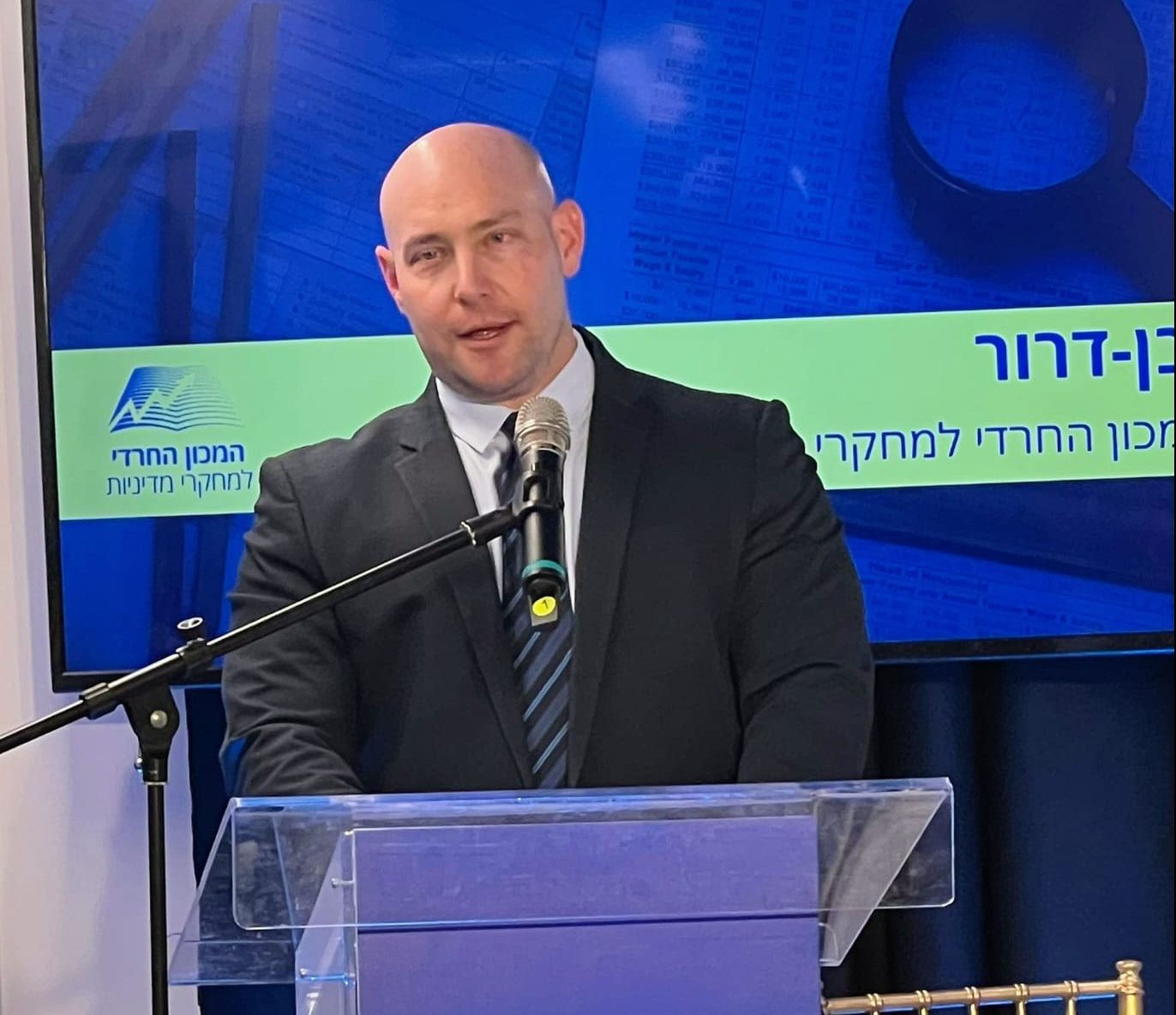The first conference in the Policy vs. Reality series, “Israel’s national budget 2023 according to Haredi society” was held on 19 March at the Institute’s offices in Jerusalem, with the participation of Minister of Economy and Industry Nir Barkat and senior officials from the public and third sectors. In his speech, Minister Barkat illustrated his economic vision for the State of Israel and emphasized that the integration of the Haredi sector in the current and future employment market is a national task.
CEO Udi Ben Dror spoke and referred to the holding of the conference while the mass demonstrations against the judicial reform are in full swing. He also mentioned that the role of the institute is to promote a strategic discussion of cooperation. After him the researchers of the ultra-Orthodox institute took to the stage and participated in a professional and extensive panel on the challenges the Haredi society faces, and how they are addressed, if at all, by the state budget that is to be approved by the Knesset.
In his speech, Minister Barkat referred to the importance of the high-tech industry for the development of the Israeli economy, and noted that if he looks years ahead, then he would like to see 25% of the workforce in Israel in the high-tech industry, 2 million Israelis in total, including Haredi people. He added that in his opinion, the private sector should be responsible for training them for the labor market.
“The best at doing this is the private sector, followed by the municipal authorities, and in last place is the Israeli government,” the minister explained. “The more responsibility we can transfer to the private sector, the better our situation will be. My ambition is for businessmen in the State of Israel to take full responsibility for the entire issue of employee training – for this matter I estimate that there is almost no budget limit.”
Barkat concluded his speech: “I see a national mission in the success of integrating the Haredi sector into the world of employment. Consider me a partner first of all for planning, and of course after that for execution. The Ministry of Economy and Industry will be at your disposal for any challenge you pose to us – because we have no choice but to succeed.” .
The CEO of the Haredi Institute for Public Affairs, Udi Ben-Dror, referred in his speech to the political discourse surrounding the judicial reform promoted by the government: “What worries the people is where the country is going and what it is going to look like in 10-20 years. On the one hand it’s a crisis, on the other hand it can become an opportunity – and that’s what I hope we’ll be able to do. The role of the Haredi institute is to try to transform the existing discourse from a confrontational one into a discourse of problem solving, strategic advancement and planning.”

Regarding the state budget, Ben-Dror said: “Unfortunately, the state budget as it currently stands lacks a real message in the main challenges of Haredi society – which are actually the challenges of Israeli society as a whole.”
The Panel of the Institute’s Researchers: Is the Budget Plan a Solution or a Problem?
In the panel of the institute’s researchers on the state budget in the light of Haredi society participated the following: Dr. Eitan Regev, VP of Research and Data at the Institute; Yehudit Miletzky, senior researcher in the field of employment; Dr. Shai Stern, senior researcher in the field of housing; and Roni Barboy, senior researcher and head of the fields of education, health, welfare and emergency policy.
Dr. Regev commented on the panel that the word “Haredi” itself has almost no appearances in the state budget, and explained that this indicates that the policy makers lack knowledge and accurate data on the Haredi sector. According to him, an effective budget policy for the Haredi sector, one that will benefit the country as a whole and remove unnecessary barriers, must be based on as detailed data as possible. “In many places, the problem in promoting an effective policy is not a lack of agreement between the right wing and the left, but the lack of sufficient and accurate information about what needs to be done and where the problems are,” he explained.
Dr. Regev provided an example of a plan that is not sufficiently based on data: “There is a lively discussion about building a new Haredi city somewhere in Kasif near Kasife in the southern region. When we check the employment and transportation data, we know that a third of the Haredi women get to work on foot, another third by public transportation, and another third of them take less than fifteen minutes to get to work. Only 29% of Haredi women have a driver’s license. Now they want to send 40-50 thousand Haredim to a place that is about an hour plus from any employment center. I’m talking about employment that exists today, not in 20 years. This is another example of how data can influence decision-making.”
Yehudit Miletzky, a senior researcher in the field of employment, stated that unfortunately the state budget as it currently stands is not “good news” in the field of employment. “There are two sections in the budget that focus mainly on technological training which will increase the number of Haredi male students, and make technological colleges accessible to more Haredi people. Nevertheless, when we try to think of the budget as a tool for implementing governmential policy, it is impossible to reach the goals of 2030 with the current budget in any way.”

“It is indeed good news that, in between the lines of the budget, the state says that they understand that Haredi people need adjustment, that employment in Haredi society has unique characteristics,” Miletzky added. “The very fact that the government put the issue of professional training on the table within the budget is a new statement after many years of very clear Tracking for the academy. The understanding that ultra-orthodox society today relies mainly on technological training is an important understanding.”
Dr. Shai Stern, a senior researcher in the field of housing, said that the current budget is “insufficient” in finding a solution to the housing crisis, but it is “a bit harmful” when it comes to the Haredi society itself. “The budget removes all kinds of barriers, in licensing, in issuing permits. It acknowledges the housing crisis and tries to give tools to local authorities and district committees to overcome bureaucratic barriers,” Dr. Stern explained. “The problem from our point of view at the institute is, that the budget does not take into account he abilities of the Haredi community to catch up with the gaps that exist in the field of housing; It even goes to the extent of being a bit harmful, in some ways to those abilities, especially when the gaps are greater than those in general society.”
Roni Barboy, senior researcher in the field of education, commented on the fact that the Haredi sector does not appear at all in the budget in the context of education, despite the many challenges that are on the table. Barboy pointed out four major challenges: the lack of a central planning body for the Haredi education system; Basic differences between the Haredi and state education systems; the improvement of supervision and regulation; And improving the quality of core studies (math, English, science and digital literacy) in elementary educational institutions for boys.
Barboy addressed the issue of core studies in the Haredi education system and offered to look at the issue from a different angle. According to her, the Haredi education system is not a single unit, and when it come to discussion on the subject of core studies, it is necessary to separate the education systems for girls and for boys. “If we break down the issue of boys’ education into its smaller parts, that means pre-primary and elementary education, then we have to remember that in these school years all boys have to study core studies to varying extents, between 55% and 100%. The problem is that the quality of the education they receive is incredibly low. It is due to the lack of personnel training – and neither the Ministry of Education nor the local authorities take care of this issue.”

